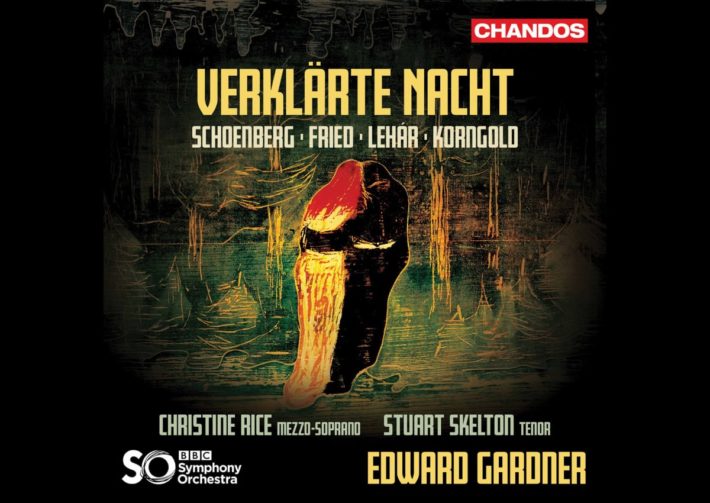At the heart of this album are two interpretations of writer Richard Dehmel’s “Verklärte Nacht”, which gives the listener interesting perspectives on the poem. The more famous rendition by Schoenberg is played after a version by Oskar Fried from 1901.
Fried, a conductor and composer (1871-1941) was a noted admirer of Gustav Mahler, making the first recording of one of the latter’s symphonies in the early 1920s. Mahler’s stylistic influences are no doubt present in the Op. 9 Verklärte Nacht: progressive tonality (the shift from minor to major that depicts a resolution of conflict), varied musical textures that paint a picture of the narrative, and a large-scale collaboration between voice and orchestra.
On the whole, the performers do a nice job bringing the poem’s to life: in it, a woman confesses to her new lover that her unborn child is another man’s. Mezzo-soprano Christine Rice evokes the raw anguish of the woman who wants to experience motherhood but finds herself in a tenuous situation. Tenor Stuart Skelton also assumes the role of the man convincingly. The manner in which he phrases the final few lines of the poem captures the man’s compassion but also his conviction in accepting that a child unbeknownst to him is to become a very part of him. The orchestra is at its best especially in the latter half of the work, as a near-Wagnerian acoustic presence that shapes the music’s powerful conclusion. Perhaps the only issue I found hard to set aside here was the balance. The vocal solos come through clearly, but when paired (as in the beginning) the voices sound lost within each other and overpowered by the denser orchestra. While this might be more an issue with the engineering, it is nonetheless a real shame given the otherwise fine performances.
Related Classical Music Reviews
- Review: Korngold – Violin Concerto, Sextet – Haveron, Wilson
- Review: “Vienna 1900” – Le Sage, Plesser, Kashimoto, Meyer, Pahud
- Review – Brahms – Symphonies No. 1 and 3 – Gardner
Arnold Schoenberg’s Op. 4 Verklärte Nacht for string ensemble was written 16 years after Fried’s. An important early tonal work of the composer, we can hear the vestiges of late Romanticism: dense textures, chromatic harmonies and a programmatic style that is almost cinematographic in its vividness. It has perhaps few elements in common with Fried’s (such as the minor-major tonal shift) but is, for me, a markedly different take on Dehmel’s poem. Fried’s Op. 9 as a vocal work focuses mainly upon the exchange between the man and the woman, but for Schoenberg, the orchestra becomes a proxy for the physical presence of the protagonists and narrator.
What results, especially from the ensemble’s well-conceived interpretation, is the appearance of an added psychological element, often mysterious and ever-morphing. Gardner brings out this element that is at times dark and brooding (track 3) but in others inquisitive, imaginative, and impassioned (track 5). The story reaches one of its most jarring peaks in the Poco Allegro (track 6), where the ensemble allows us to vicariously experience the woman’s most intense emotion – the urgency she expresses in the poem when she says that life has taken its revenge upon her.
The Pesante-Grave (track 7) plunges us deep into her conflict between despair and sadness through some of Schoenberg’s chilling harmonies. The low strings are a resonant backdrop in the dramatic sections while the sadly pensive musings are captured through the delicate tone quality of the violins (1’10-1’33). The arrival of the major section (track 8) is particularly cathartic in light of the prior moments; there remain some traces of the aforementioned mysterious presence in the Adagio molto tranquillo (track 9) but as the story ends, they finally evaporate as the strings fade away in the gentle finale.
Korngold’s Lieder des Abschieds, once again featuring Skelton, is a nice addition to the album. The expansive, almost hopeful sounding melodies of Sterbelied (track 11) belie the fact that the piece is a requiem – but is nonetheless a gripping performance. Skelton displays a skilled voice control that often highlights the composer’s refreshing tonal colors.
The liner notes give us not just a historical introduction to the works but some added compositional insights into the two versions of Verklärte Nacht, supplementing the listener’s perspective. Despite some of the mishaps with the sound engineering, Gardner and the orchestra have a solid output, one that captures the deeper subtleties of the music.

“Verklärte Nacht”
Lehár – Fieber
Fried – Verklärte Nacht
Schoenberg – Verklärte Nacht
Korngold – Lieder des Abschieds
Christine Rice – Mezzo-Soprano
Stuart Skelton – Tenor
BBC Symphony Orchestra
Edward Gardner – Conductor
Chandos Records, CD CHSA 5243
Recommended Comparisons
Read more classical music reviews or visit The Classic Review Amazon store
Follow Us and Comment:
[social_icons_group id=”964″]
[wd_hustle id=”HustlePostEmbed” type=”embedded”]











